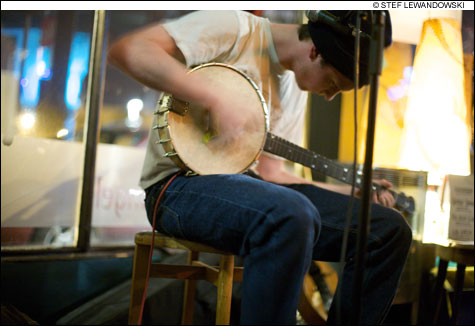
KEEPING HIS HEAD DOWN: And his eyes upon the strings: Sam Amidon. |
Released this summer, Nico Muhly's Mothertongue (Bedroom Community) — the latest album by the ambitious contemporary classical music composer, a protégéof Philip Glass — offers listeners a bombastic example of the ongoing collaboration between the composer and Vermont-based folk singer Sam Amidon. The fifteen-plus-minute suite "The Only Tune" is a lavish reinterpretation of the traditional folk song "Oh, the Wind and Rain (The Two Sisters)," a strange and heartbreaking yarn about a sororicide, a miller who collects the dead body but does not bury it, and a fiddler who makes himself an instrument out of its hair and bones.Amidon, in his mundane but pristine voice, embellishes the lyrics by reciting the first few bars over and over, adding one word each time. (His tonality — which spans distant pitches without a hint of hesitation — is inspired in part by shape note singing.) Muhly's composition, in turn, vacillates between drastic ornamentation (the sound of sharpening knives, a chorus of looped and chopped syllables, swells of woodwinds, harsh piano notes), eerie calm, and cleansing warmth.
"The Only Tune" indicates a partnership of unlikely contrasts — Amidon's plaintive beauty acting in concert with Muhly's frantic maximalism — but Amidon's second album reveals their connection to be much more malleable. Dignified yet innovative, All is Well (Bedroom Community) is one of the best folk albums I've heard this year, and Amidon appears at One Longfellow Square to support it on Friday, December 19. (Opening the 8 pm show are the wonderful local ambient-folk act Cerf-Volantes.)
Like "The Only Tune," All is Well is comprised of Amidon's reinterpretations of public-domain folk tunes; he keeps the lyrics intact but sometimes drastically alters their structure and traditional chord progressions. Here, Muhly and Amidon exercise a restraint that feels effortless, each song a balloon blown up until just before it would burst.
Amidon recorded the songs solo, with banjo and guitar, in Iceland, and left the recordings to Muhly and Icelandic producer/engineer Valgeir Sigurdsson (Bjork, Kronos Quartet), among others, to orchestrate and manipulate. (When I asked Amidon about his role in the process of making the album, he said it was "a bit more curatorial or like an editor [rather] than a creator.") Most of the generations-old folk songs Amidon employs are just a verse or two long in their natural state, but the average track on All is Well run close to five minutes.
Opener "Sugar Baby," one of a few lover's laments on the album, moseys along a slow, 4/4 time signature. Amidon turns the lines "Got no sugar baby now/Got no honey baby now" into the song's constant refrain, and it feels more like a rumination on loss than the bitter, bluesy take by Dock Boggs on Harry Smith's 1952 Anthology of American Folk Music (Smithsonian Folkways). The technique also reveals the great sadness of other lines in the song, like "Got no use for a red rocking chair." The first few minutes are sparse and stark; later, accents of oboe help the song's natural gravity sink in.
Nico Muhly's touch is more distinctive in other areas. The immaculate "Saro," about a man journeying far from his lost love, is buoyed by fluttering woodwinds and anchored by mournful brass. On "Wild Bill Jones," a man murders a cowboy who's cavorting with his girlfriend, and scattered plinks of piano give the tale a film score's epic sweep. Album closer "All is Well" is an opulent and cathartic coda, giving a wisp of optimism to all the sad beauty that precedes it.
Even though Amidon's not technically a songwriter (when asked if he's considered writing original material, he said "maybe I should try"), his revisionist folk songs are a relevant and distinctive form of storytelling. All is Well seems less a modernizing of Americana's ethos than a reminder that its sentiments will always ring true.
Christopher Gray can be reached at cgray@thephoenix.com.
ALL IS WELL by Sam Amidon on Bedroom Community | at One Longfellow Square, Portland | December 19 at 8 pm | with Cerf-Volantes | $10 | 207.761.1757